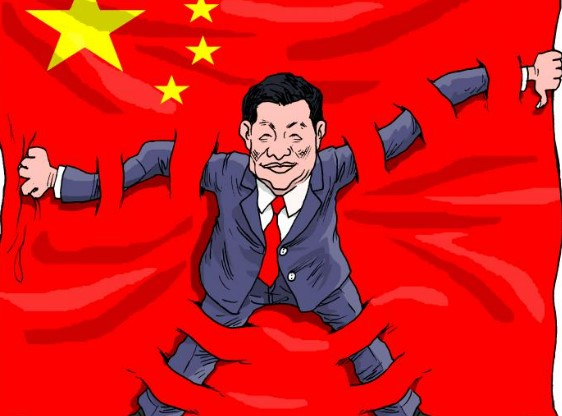Virendra Pandit
New Delhi: All three of them—US President Joe Biden (79), and his ‘younger’ counterparts in Russia and China, Vladimir Putin (70) and Xi Jinping (69)—are ailing, prisoners of the past, and medically unfit; but each of them is ready to give the world his parting shot.
While Biden is trying to hold on to America’s ‘superpowerdom’, Putin is struggling to stay afloat in the Ukrainian marshes. But Xi Jinping takes the cake: he has vowed to make China dominate the world by 2049 when his communist caliphate completes a century of Revolution.
He apparently believes he is the new incarnation of the Dragon King!
After kicking out his immediate predecessor Hu Yaobang in full public view on October 22 from the concluding session of the 20th National Congress of the Communist Party of China (CPC), Xi secured a third five-year term as ‘Chairman of Everything’ — CPC’s General Secretary, President of China, and Chairman of its Central Military Commission.
Believing in his own invincibility—even Stalin, Hitler, and countless tinpot dictators down the line did likewise—Xi has stepped into the shoes of the Communist God of China, Mao Zedong. His sole goal, as of now, is to make his country dominate the world by 2049! If he survives until then, he will be 96 years old!!
At the opening of the CPC’s jamboree (October 16-22) last week, Jinping reiterated his goal to make China a modern socialist power by 2035, boosting per capita income to middle-income levels and modernizing the armed forces.
Then by 2049, the 100th anniversary of the People’s Republic of China, he wants to ensure the nation “leads the world in terms of composite national strength and international influence.”
The problem is: the world is not ready to buy his offer and refuses to toe this line.
So, the world markets responded quickly. Chinese assets plummeted earlier this week after he surrounded himself with yes-men. They include Shanghai party chief Li Qiang as the rubber-stamp Prime Minister despite his lack of central government experience. The media reported that he also signaled a shift of priorities from economic development toward security, heightening investor anxiety over how an unrestrained Xi will steer the country.
“He’d want his legacy in history to be that he achieved the 2049 goal,” said Charles Parton, a former British diplomat, and fellow at the Council on Geostrategy and the Royal United Services Institute. “Which, if you translate it from party speak, is to become top dog, knock America off its perch, and order the world so that its governance better suits China’s interests and values.”
But this is easier said than done.
For, ever since he became China’s President in 2012, Xi has antagonized old enemies overseas and created a million at home. Beijing now has territorial disputes with a dozen countries—India is the largest of them—and, in the guise of eradicating corruption, he has sacked or jailed over a million members of the CPC and business class alike. Xinjiang is China’s soft underbelly, Taiwan an eyesore, and the South China Sea a marshland. Each of these volcanoes may explode at any time, and each can boomerang on the Dragonland with equal ferocity. Like any other ordinary dictator, Xi Jinping is also trying to whip up a nationalist frenzy to mask his mounting failures.
Xi Jinping’s roadmap is, therefore, full of major contradictions. The current ones are: boosting economic growth while locking down a hundred cities under Zero Covid madness, and ensuring technological self-sufficiency while wiping USD 1.5 trillion off the key technology sector.
And perhaps the biggest of all is: risking a catastrophic war over Taiwan to complete a “historic mission” and “a natural requirement for realizing the rejuvenation of the Chinese nation.”
“He’s eyeing having an important position in the history books,” said Liu Dongshu, Assistant Professor at the City University of Hong Kong. “A lot of things, including the Taiwan issue, are part of the narrative he can use to justify his extraordinary efforts to take a third and even a fourth term. If you want to break the rule, you need a reason.”
When Xi rose to power in 2012, some hoped he would follow his reformist father Xi Zhongxun, who was purged and imprisoned, in seeking to liberalize China at home and open it further to the rest of the world.
Instead, he ended up increasing the CPC’s role in running the economy and centralizing control to make himself China’s most powerful leader since Mao Zedong. He crushed dissent from Xinjiang to Hong Kong and eroded four decades of power-sharing at the top levels of the CPC.
Overconfident, he struck a defiant tone in his October 16 speech to open the party congress, saying China wouldn’t change course even as it faces “dangerous storms” in a more hostile world. He pushed for China’s model as an alternative to Western democracy, vowing to overcome the Biden administration’s efforts to hobble the nation’s development by depriving it of silicon chips and other advanced technology.
“Chinese modernization offers humanity a new choice for achieving modernization,” he said.
This showed he was bracing for a confrontation with the West, and investors reacted quickly. As soon as Xi unveiled the new elite 7-member Politburo Standing Committee packed with his toadies, stocks in Hong Kong capped their worst day since the 2008 global financial crisis on Monday and the yuan weakened to a 14-year low. The historic sell-off rebounded slightly as panicked Chinese officials sought to reassure investors.
Losing the world’s trust after the outbreak of the pandemic in early 2020, China still has no clear path out of Zero Covid policy, which has further hurt an economy weighed down by a property crisis and tech clash with the West.
The Chinese know the world doesn’t trust them—nor do they trust the world!
That’s China’s Achille’s heel.

